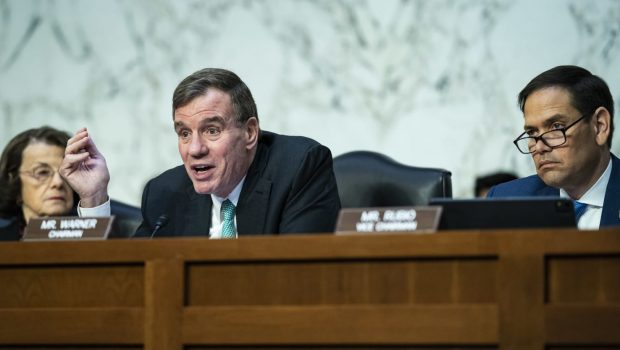Cybersecurity May Be the One Issue That Unites a Deeply Divided Congress
LAS VEGAS, Nevada—Despite a divided Congress, an influential Senate Democrat says legislation addressing the technology “arms race” with China and issues related to social media could be passed in the current two-year term.
With some analysts saying that U.S. technology companies are lagging behind their Chinese rivals in areas such as artificial intelligence, quantum computing and advanced energy, Sen. Mark Warner of Virginia told The Daily Beast that he sees broad support among lawmakers for measures aimed at increasing investment where the risks are evident and potentially dire.
“Anywhere we are going to be in a technology arms race with China, I think we can get some things done,” Warner, chairman of the Senate Intelligence Committee, said in an interview at the CES technology trade show on Friday.
Those efforts need both government and private investment if they are to be successful, said Warner, a former mobile tech executive before embarking on a political career that led him to the governor’s mansion in Virginia and election to the U.S. Senate in 2008.
The prospects for legislation tightening social media regulations are less clear, but could tie into the national security examination, he said, with the popular video-sharing app TikTok driving the conversation.
TikTok, which says it has more than 1 billion active users around the globe, has raised concerns among lawmakers in both parties who fear it could be used as a surveillance and propaganda tool by the Chinese government.
TikTok has repeatedly denied that the Chinese government exerts any control over its content or has requested data on its users.
Already the federal government and at least 19 individual states have banned TikTok from government computers. When he was in office, former President Donald Trump sought to force TikTok’s parent company, Beijing-based ByteDance, to sell the service to a U.S. company through an executive order later rescinded by President Joe Biden.
In Congress a bipartisan group of lawmakers introduced legislation late in the 2022 session to “protect Americans by blocking and prohibiting all transactions from any social media company in, or under the influence of, China, Russia, and several other foreign countries of concern.” No action was taken, but the bill or something similar could be reintroduced in the current session.
Warner indicated he doesn’t favor such a broad-brush approach, but said that action to address the TikTok controversy is likely.
“I’m not talking about a single-app ban, but the security challenge that TikTok poses to our kids is alive and real,” he said.
“The security challenge that TikTok poses to our kids is alive and real.”
— Senator Mark Warner (D-VA)
Warner lamented that Congress has not acted to shore up privacy protections and address other concerns related to social media. “It’s just mind-boggling to me that we sacrificed American leadership on that,” he said
Despite concerns on both sides of the aisle, he thinks party divisions could limit legislation during the current term to “some small-ball things,” such as setting data portability standards and outlawing “dark patterns”—website and app designs that mislead or coerce users into making unintended purchases or bad choices by making it nearly impossible to exit.
One possible exception, said Warner, would be legislation to increase protections for kids and address social media’s impact on their mental health. “Something around kid safety would be broadly bipartisan,” he said.
Warner’s Friday interview with The Daily Beast occurred shortly after appearing on a CES panel with fellow Democratic Senators Jacky Rosen of Nevada and Ben Ray Luhan of New Mexico, both of whom also have been active in drafting tech-related legislation, to discuss a broad array of matters that are on lawmakers’ minds at the top of the new session.
Among other things, the trio discussed advocating for stronger cybersecurity protocols in both the private and public sector, particularly regarding health information. “I see…all the new innovation in health care, but unless and until we can make sure that cyber protections are actually built (into) health- care systems rather than bolted on, I don’t think we’re going to get this right,” Warner said.
They also discussed the need to closely monitor spending of $65 billion authorized by Congress to expand broadband access in rural and underserved communities to ensure that it addresses the “digital divide.” Rosen said she and Luhan both helped write the broadband section included in a bipartisan infrastructure bill passed by Congress in 2021 in an effort to make sure that Federal Communications Commission maps of coverage areas reflect realities on the ground.
And there were also comments about efforts to revise or eliminate Section 230 of the 1996 Communications Decency Act, which provides internet publishers with legal immunity from liability for content posted by third parties on their platforms. Warner indicated that he considers significant action on this unlikely because of deep party divisions.








Gloss